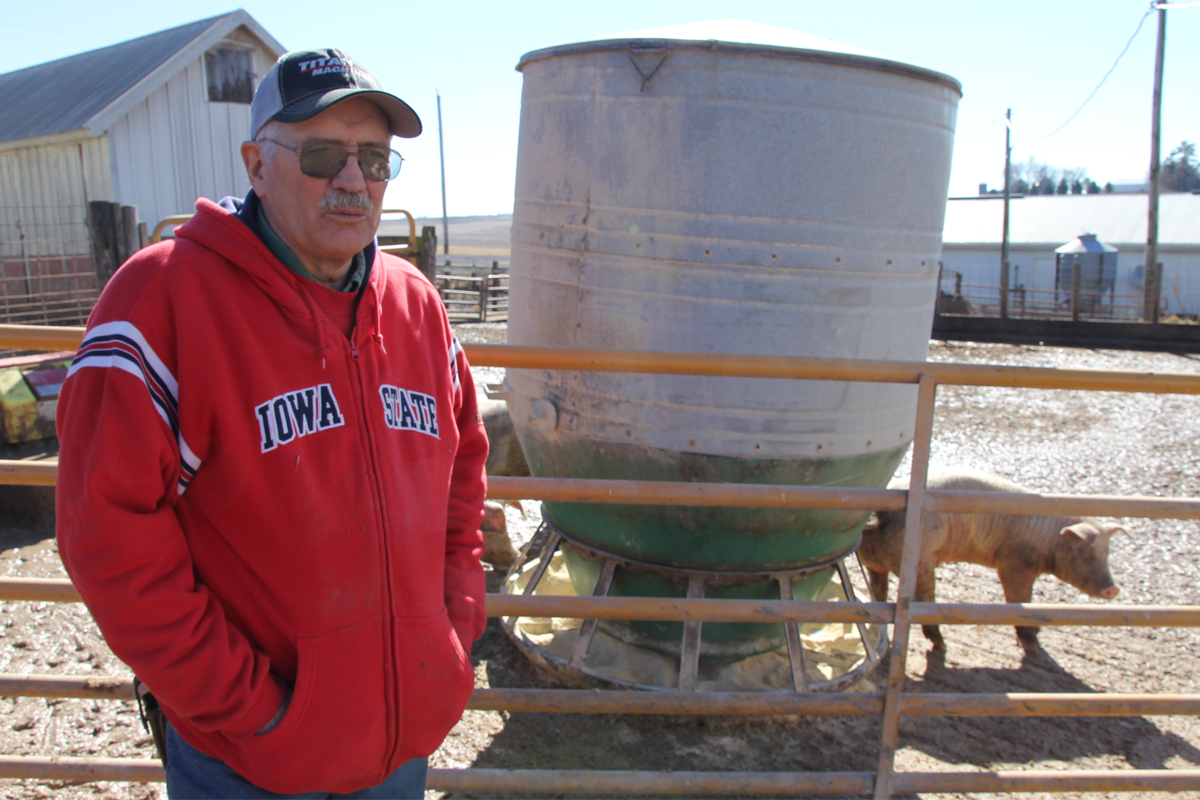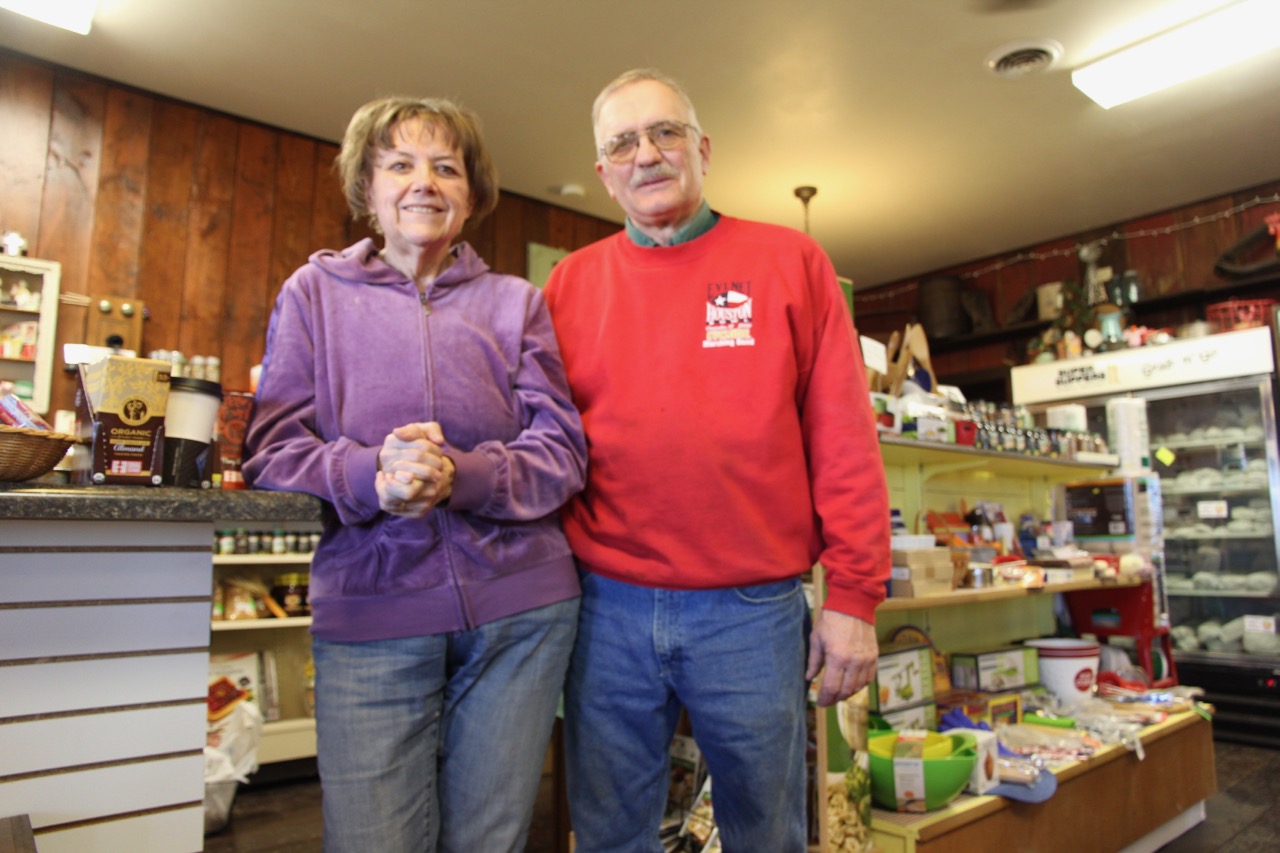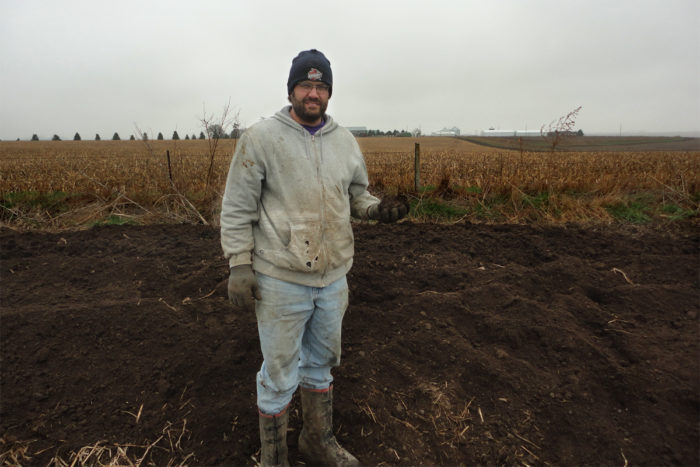Civil Eats: Surrounded by Big Agriculture, Ron Rosmann Innovates and Inspires
Long focused on animal welfare and diverse rotations, this veteran Iowa farmer stands out for his commitment to stewarding the land and teaching others.
By Twilight Greenaway
Posted on: February 21, 2018
When I met Ron Rosmann last winter, he’d just had a small windfall. The Harlan, Iowa farmer was in the process of building a new hoop house for his farrow-to-finish pork operation and he’d come into some high-quality farrowing equipment—the parts needed to keep sows and their piglets warm and safe during the first weeks of their life—for a bargain. But the circumstances were bittersweet.
Rosmann’s friend and a fellow hog farmer in the area was selling off the equipment because he had gotten out of hog production. “It’s sad because he has a quarter of a million dollars worth of facilities,” Rosmann said. “He used to raise [hogs] conventionally and now there’s no money in it unless you’re huge.” The farmer in question was nearing retirement age and he had no family members willing to take over the operation, so he’d decided to shut it down completely. This was just the latest in a series of family farmers Rosmann has seen close up shop over the last few decades. “It’s just typical of what farming is like out here in the Midwest,” he told me.
Rosmann is in a different position. He and his wife Maria raise certified organic pork and beef under their own private label and for Organic Prairie, as well as corn, soy, and a range of other grains and hay in a diverse rotation on 700 acres. And as they look toward retirement—Ron Rosmann is about to turn 68—their sons, David and Daniel, are working to succeed them. In fact, their family was just chosen as Organic Farmers of the Year by the Midwest Organic & Sustainable Education Service (MOSES).
You could say he’s one of the lucky ones. But, if you meet Rosmann and his family, you’ll quickly realize that luck has had very little to do with it.
Take their commitment to biodiversity. The farm is divided into around 40 different fields, and in order to maintain soil health and reduce pressure from pests, they grow corn, soy, hay, oats, popcorn, turnips, and other crops in a constantly changing rotation. Some of those crops leave the farm, but much of it gets fed to the pigs and cows they raise. “We don’t buy anything!” said Rosmann.
It can be a challenge to keep this ever-changing rotation straight, he adds. But that’s key to his approach. “You have to be willing to change your mind all the time,” said Rosmann. “You can’t be set in your ways. But that’s what I love about this kind of farming. You have to be responsive to the indicators and the information out there.”
For instance, the farm survived the farm crisis of the 1980s—a time when many families in the area lost their operations due to mounting debt—by expanding on a modest scale, and taking out a bank loan to put in a farrowing nursery. Then they were early in the transition to organic and secured a coveted contract with one of the only companies paying a consistent premium for organic meat on a national scale.
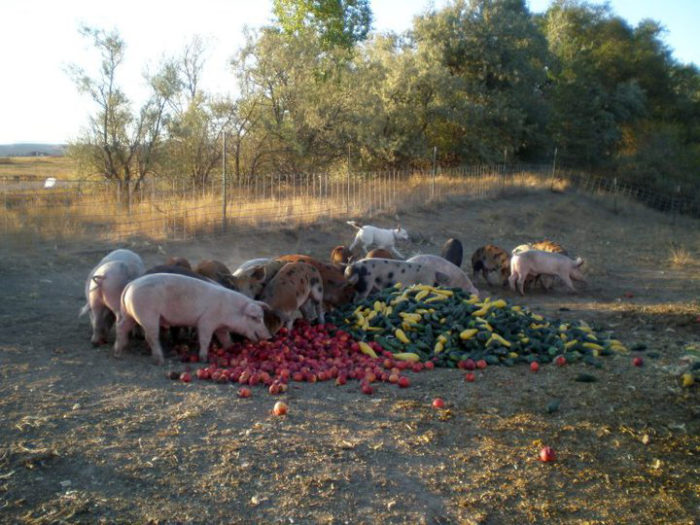
Surrounded by miles and miles of conventional corn and soy, just 50 miles east of Omaha, Rosmann Family Farms also serves as a beacon for those looking for local food in the area. Maria runs a small on-farm store where she stocks everything from their farm’s meat and eggs to locally made gifts and holistic body products. Meanwhile, their son Daniel and his wife Ellen run a farm-to-table delivery service and a restaurant called Milk and Honey that sources many of its ingredients directly from the farm.
And aside from running his own business, and preparing to pass it on to his sons, Rosmann has also been an avid spokesman on the issues affecting small- and medium-scale farmers like himself.
After earning a degree in biology from Iowa State, Rosmann returned to his family farm for a trial year in 1973. But his parents gave him more autonomy than most, and he realized he decided to dig in and make it his own. “I was chastised by some people who said, ‘why did you come back, if you’re a college graduate?’ You’re supposed to leave the farm, leave rural areas to improve your life.” But Rosmann felt just the opposite; he stayed, in part, he said, because “you could make a difference in a small community” by sticking around.
Rosmann’s father was an early adopter when it came to using synthetic fertilizers and pesticides, but after his father passed away, Rosmann says he began experimenting with alternative methods, and by 1983 he decided to reverse course.
One of the major revelations came when he went to a field day at the farm of fellow Iowan Dick Thompson, who had eschewed conventional pesticides and fertilizers in the late ‘60s.
“He had a cleaner farm than we did and he wasn’t using any pesticides. I said, ‘I can do what he’s doing,’” Rosmann recalled. He was also intrigued by Thompson’s use of on-farm research using replicable, randomized strips. “These were environmentally friendly practices that didn’t hurt your pocketbook—in fact they helped. The goal was to get the same yields using less pesticides and fertilizers and then have proof that it would work, and learn from other farmers who were experimenting as well.”
Three years later, in 1986, Rosmann joined Thompson as a founding board member of Practical Farmers of Iowa (PFI), a nonprofit organization that has remained dedicated to these goals ever since, and has grown from around 50 farmers to more than 3,000.
Farmers like Rosmann and Thompson relied on tools like the late-spring soil test, which allows them to measure the amount of nitrate in the top layer of soil when their corn plants were young, so they could accurately gauge the amount of nitrogen they would need to add to the soil before harvest time. “It helped us place that nitrogen very precisely. We were cutting our nitrogen 50-75 percent and sometimes we found that we didn’t need to add nitrogen at all.”
The idea was to help farmers maintain autonomy in the face of massive farm consolidation and changes to the industry. Rosmann says that while there was a lot of interest in the late-spring soil test at the time, the tool’s popularity soon waned as the seed and chemical companies began to get a tighter hold on commodity agriculture.
“Biotech and Roundup came along. Farms were getting bigger, prices were low for commodities. The attrition of farmers kept going at a steady pace,” said Rosmann. Soon, he adds, “most farmers weren’t even willing to cultivate
[as an alternative to using herbicide to control weeds]
or test their nitrogen. They became paranoid, and said, ‘we’ve got to get this done in the fall.’ That’s the norm now. They put the nitrogen on in the fall, and 40-50 percent ends up in the groundwater because of leaching and warm weather.”
In Iowa, over the last few decades, this shift has had a nearly disastrous affect. Thirty years later, the ongoing nitrogen and phosphorous pollution has resulted in a high-profile lawsuit and a recent decision by state lawmakers to spend $282 million over the next 12 years on cleanup and prevention. Since then, PFI has played an important role in helping farmers diversify their farms, transition to organic in some cases, and just work in harmony with the natural world more generally.
Although PFI has remained an apolitical organization in an effort to reach farmers from both organic and conventional farms, Rosmann himself has always believed it was important to engage with policy. He and Maria have lobbied congress with organizations like the Pew Charitable Trust and Center for Rural Affairs on issues like farm consolidation and the overuse of antibiotics on farms. He also served as a board member and president of the Organic Farming Research Foundation for a number of years.
And he remains committed to on-farm research. For instance, Rosmann uses a lesser-known approach called ridge-tilling, which reduces the disturbance of the soil and helps retain organic matter—and he has produced data to support its efficacy. “I’ve done research trials comparing conventional disk-tilling and ridge-tilling. Every year, we get 5-7 percent more weeds in the area we disk till. So it’s a good tool for organic farmers,” said Rosmann, who adds that it’s hard to find the equipment because the practice has gone out of vogue in recent years.
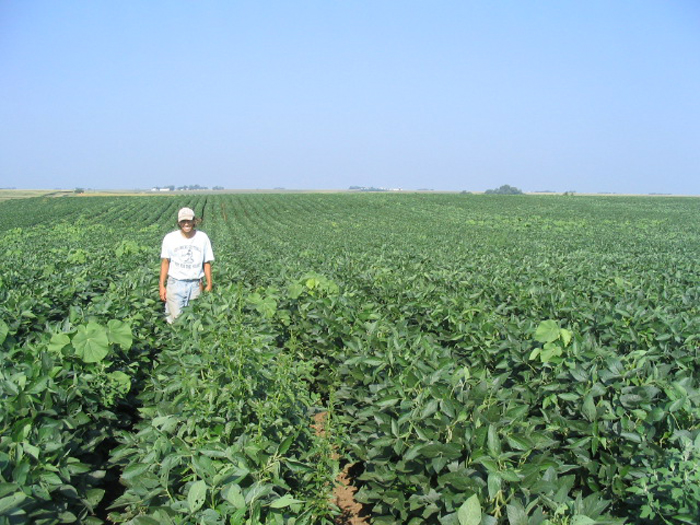
He also prides himself on fixing his own farm equipment and acquiring much of the farm’s machinery used, an approach that is increasingly rare in the age of $250,000 tractors that can only be repaired by the companies that make them.
In all these ways, Rosmann stands out as a modern version of Jefferson’s educated yeoman farmer, “an enlightened citizen, trained in many fields,” motivated by the opportunity to be a steward the resources of land and community.
It’s a noble life, but also a lonely one, and Rosmann doesn’t always see eye to eye with many of the farmers in his community. So he relies on the PFI network as a way to stay connected to the handful of other “elder statesmen” farmers around Iowa and beyond.
“There are very few of us left with native knowledge passed down from our fathers,” said Rosmann. “But that’s the beauty of having Daniel and David here.” With his sons, he adds, the desire to stay curious and continue working at a human scale is a given.
Near the end of my visit to his farm—after I’d perused the hand-stitched tea towels in Maria’s shop, heard about the details of farrowing piglets, and toured the barn Rosmann’s father had built—we ducked into small stand of white pine trees he had planted in 1993 as a windbreak and wildlife refuge. The trees attract deer, a pest, but they also provide a rare home for pheasants, the occasional quail, and several other types of upland birds.
After a windy climb up a small hill, we stepped between the branches and the sound of the wind came to a stop. In that hushed environment, it was easy to imagine a time when many of Iowa’s diverse farms were dotted with trees. “We have more pheasants on our farm than any other in the county,” said Rosmann, lowering his voice so as not to scare off the visitors. And I pictured him and his family members stepping in among the trees every now and then when the day-to-day work of swimming against the agriculture tide becomes too much.
Then we turned and waded back through the February mud so Rosmann could take me to see his cows.
